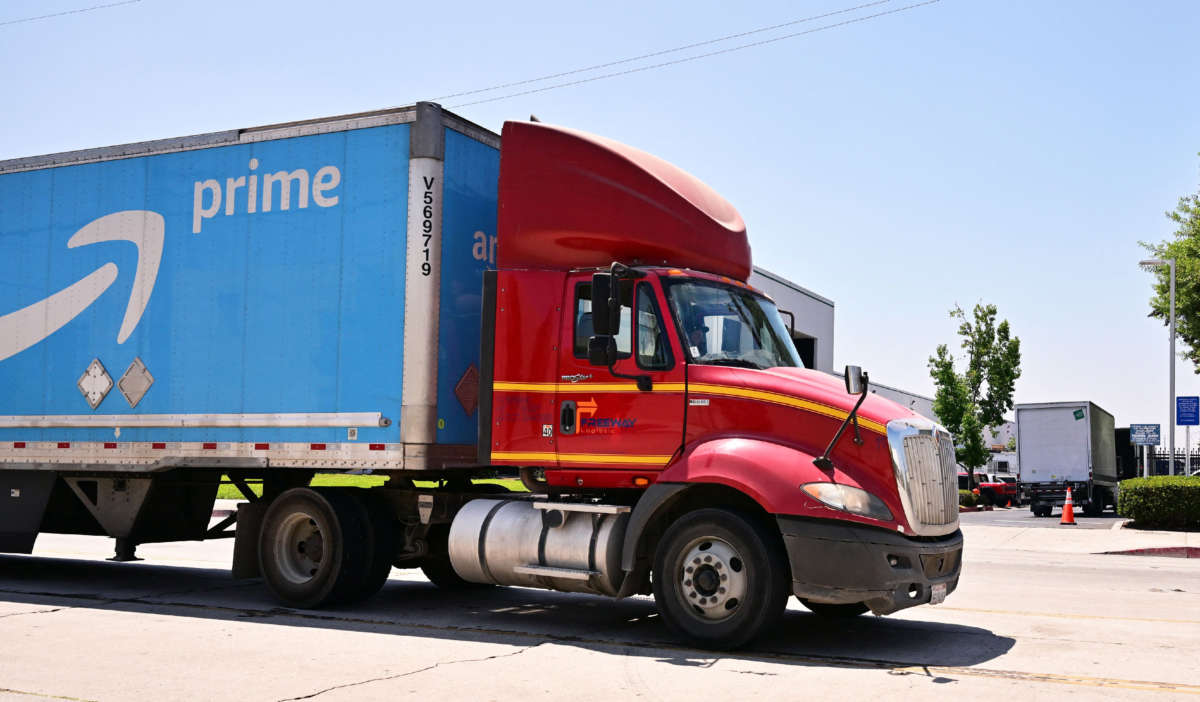Support justice-driven, accurate and transparent news — make a quick donation to Truthout today!
Amazon workers at a warehouse in Moreno Valley, California, have filed to join Amazon Labor Union (ALU), the independent union behind the first ever successful unionization at an Amazon warehouse earlier this year.
Workers had announced their union drive last month, writing in a GoFundMe appeal earlier this year that workers at the facility are “overlooked, overworked and underpaid.” If successful, they will be the second or third Amazon warehouse to unionize. They are also the first Amazon workers in California to seek a union election.
The bargaining unit for the warehouse, known as ONT8, would cover about 800 workers, according to the National Labor Relations Board (NLRB). It’s unclear how many workers have signed union cards; at least 30 percent of eligible workers need to sign in order to qualify for a union election.
ALU president Chris Smalls celebrated the news on Tuesday. “BIG NEWS,” he wrote on Twitter. “[C]ongratulations to the courageous worker leaders to put in that work daily on the ground.”
Union organizers have said that unionization will provide workers the opportunity to have more say over their working conditions and compensation. “We’re just trying to do right by our workers,” Nannette Plascencia, a leader in the union movement at ONT8, told the Los Angeles Times.
Smalls has likened the spread of ALU’s union movement to that of Starbucks workers, who have now unionized over 230 stores in just about a year after launching their union movement.
“Today, we’re bicoastal,” Smalls said when the California workers announced their union effort last month. “This is something that’s really going to continue to grow, just like Starbucks.”
The Amazon workers also join a growing union movement in the U.S. in general. Union filings grew by 53 percent in Fiscal Year 2022 over the previous year, according to data released by the NLRB last week. This data confirms, as labor advocates have observed, the staggering growth of the union movement over the last year, which has seen union filings and wins from workers at nationally known companies like Apple, Trader Joe’s and Home Depot.
Amazon has maintained that it prefers workers not to unionize. The company has spent millions of dollars on its anti-union efforts, firing union organizers and calling the police on union organizers handing out union literature outside company warehouses.
Yes @Amazon my Handle stands correct you forgot to mention the part that is created when I was wrongfully fired for speaking out against your failed Covid-19 response in 2020 has nothing to do with a Strike. Also ALU is the workers so they will decide how to fight thanks🫡✊🏽 pic.twitter.com/nn53dwoeVw
— Christian Smalls (@Shut_downAmazon) October 11, 2022
The filing comes as workers in Albany, New York, are beginning to vote in their union election on Wednesday, seeking to join the ALU. The unit would cover about 400 workers in the warehouse.
Albany workers had filed to unionize in August, citing low wages and safety concerns – the latter of which became an especially pronounced issue last week, when three Amazon warehouses, including the unionizing Albany warehouse and the unionized warehouse in Staten Island, caught fire.
Workers staged a work stoppage in Staten Island when a trash compactor caught fire and refused to return to work while they could still smell smoke in the warehouse. In response, the company suspended dozens of workers who had participated in the stoppage.
ALU denounced the company’s response to the work stoppage. “Amazon’s response to our genuine concerns has been despicable and full of lies,” the union wrote. “At this time, management is circulating that as many as 80 workers who were involved in the work stoppage were suspended. That is not, as their PR team claims, a ‘handful.’”
Holding Trump accountable for his illegal war on Iran
The devastating American and Israeli attacks have killed hundreds of Iranians, and the death toll continues to rise.
As independent media, what we do next matters a lot. It’s up to us to report the truth, demand accountability, and reckon with the consequences of U.S. militarism at this cataclysmic historical moment.
Trump may be an authoritarian, but he is not entirely invulnerable, nor are the elected officials who have given him pass after pass. We cannot let him believe for a second longer that he can get away with something this wildly illegal or recklessly dangerous without accountability.
We ask for your support as we carry out our media resistance to unchecked militarism. Please make a tax-deductible one-time or monthly donation to Truthout.
